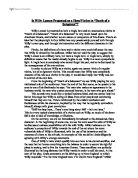Both of the boys feel his death was unnecessary. Happy’s feeling that he could have “helped” Willy is just another empty Loman speech, devoid of any real meaning. We see during the course of the play that Happy neglects to give Willy any help whatsoever, he abandons his father in the restaurant and as Linda points out in Act Two: -
“Not one, not another living soul would have had the cruelty to walk out on that man in a restaurant.”
Biff does not see his father as a failure, he realises that Willy “had the wrong dreams. All, all wrong.” While both boys have absorbed their father’s ideas, Happy lives them and is determined to “beat that racket,” Biff has now realised that he doesn’t have to conform to a society which measures people in terms of popularity and material wealth. Biff’s declaration, “I know who I am,” proves to us that he has realised his father’s limitations, while Happy seems to have inherited his father’s trait of self-delusion.
Miller’s characters speak with realism, as American people of this era actually did, and do not have long articulate speeches about their innermost feelings. At such an emotional time Charley’s remark that Willy was “ a happy man with a batch of cement” may seem inappropriate but we have to take into account that ordinary people do not speak in poetic language.
Charley’s speech in this scene is one of the most memorable passages in the play. It serves as a kind of eulogy, which removes blame from Willy as an individual by explaining the gruelling demands and high expectations of his profession. Charley’s admiration and respect for Willy is evident in the line “Nobody dast blame this man,” and his speech demands that we should admire Willy for his drive and dream. Charley observes that a salesman’s life is a constant upward struggle to sell himself and he supports his dreams on the power of his own image “riding on a smile and a shoeshine.” What started out as a tribute to Willy becomes a generalisation towards all salesmen, Miller points out that there are many “low-men.” Charley points out that when the salesman’s advertising self-image fails to inspire smiles from customers, he is “finished” – in Willy’s case this was psychologically, emotionally and physically as well as his career. According to Charley “a salesman is got to dream,” this substitution of “is” for “has” seems to indicate a necessity for a salesman. Miller suggests that the salesman is “literally begotten with the sole purpose of dreaming”.
Many writers of this era were concerned at the increasing emphasis on materialism and consumerism, such as Steinbeck. In many ways Willy has done everything that the American Dream “of unrestrained individualism and assured material success” outlines as the path to success. He has a home and a range of modern appliances; he has raised a family and journeyed forth into the business world full of hope and ambition. In spite of all this Willy has failed to receive the gains that the American Dream promises. Miller’s contempt for a society in which a man is worth more dead than alive is obvious. Death of a Salesman condemns the American Capitalist society, which throws people on the scrap heap as soon as they are unable to contribute to the financial gain of others. On the opening night of this play Miller recalls a woman angrily describing the play as a “time-bomb under American Capitalism.” We see how the Requiem does not allow this, that the Loman’s are “free.” Miller rejects the view that this is a play designed to overthrow the social system of America. He claims that aims rather to destroy “this pseudo life that thought to touch the clouds by standing on top of a refrigerator.” The American Dream and the way in which capitalist society measures people in terms of material success is once again condemned in Charley’s line “No man only needs a little salary,” suggesting that no man can live on money and materiality alone without an emotional or spiritual life to provide meaning.
Linda’s feeling that Willy is just “on another trip” suggests that Willy’s hope for Biff to succeed with the insurance money will not be fulfilled. One could even wonder whether or not the family received the insurance money as no mention is made of it, although this could also be interpreted as the money is of no real importance to them. It is bitterly ironic that a man, who kills himself because he feels a failure, fails in death. Linda’s comment also seems to strip Willy’s death of any of it’s imagined dignity; the “trip” Willy has now undertaken, will end just as fruitlessly as the “trip” from which he has just returned from as the play opens. Linda’s statement “we’re free” which is repeated three ways can be interpreted in three different ways, Willy is now free from earthly unhappiness. The couple are free from the need to earn money for the mortgage and, in another sense, the family is free to act without the pressure of Willy’s dreams.
In this scene we see no more of Willy’s memories, there are no expressionistic devices such as Ben, who represents Willy’s desire for success. Ben’s absence suggests that Willy has finally achieved the success that he so desperately wanted in life but could never realize. The expressionistic device of the flute motif that opens the play also ends it; we see how Miller parallels the structure of the play throughout. The haunting flute music, which symbolises Willy’s pursuit of the American Dream of freedom and success, and the visual imprint of the “solid vault of apartment house”, seem to suggest that nothing has really changed and Willy dies just as deluded as he lived.







